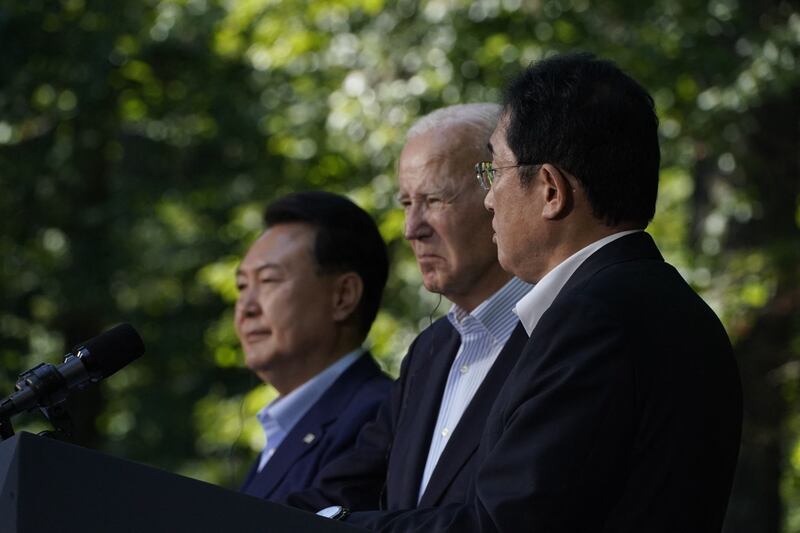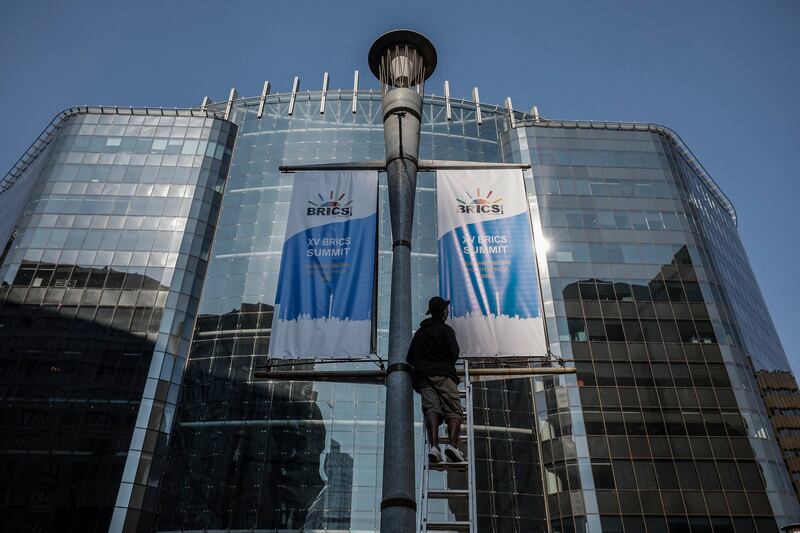In a rare trip abroad, Chinese President Xi Jinping is due to touch down in Johannesburg, South Africa, on Tuesday to attend a BRICS summit that state media is hailing to be a grand new start for the Global South.
The BRICS Summit will get underway on Wednesday with at least 40 heads of state and government joining South Africa’s Cyril Ramaphosa, China’s Xi, India’s Narendra Modi and Brazil’s Luiz Inacio Lula da Silva.
Russian Foreign Minister Sergei Lavrov will represent Russia's President Vladimir Putin, who is attending virtually due to the threat of arrest for alleged war crimes.
In 2023, Xi has made foreign dignitaries come to him – including a slew of the Biden administration's top staff – breaking with his routine only for a border hop in March to touch heads with Russian President Vladimir Putin and offer his continued support for Putin's invasion of Ukraine.
BRICs came into being in 2009, as an informal grouping of Brazil, Russia, India and China with the addition of South Africa the following year. The name had been around since 2001 when it was coined by then-Goldman Sachs Chief Economist Jim O’Neill.
The BRICS summit comes in the shadow of mutual pledges of support last week between the United States, Japan and South Korea to counter Chinese aggression in the Taiwan Strait and in the South China Sea.
On Friday at Camp David, Japan, South Korea and the U.S. had agreed to meet annually and discuss all regional security issues on a threeway hotline, President Joe Biden said.
The U.S. president said that military exercises will be held between the countries each year with the aim of prioritizing the “peaceful resolution of disputes in the South China Sea.”

Biden hosted South Korean President Yoon Seok-youl and Japanese Prime Minister Fumio Kishida at Camp David amid a push to seize on a slim window of opportunity to “institutionalize” ties and ultimately make them a trilateral alliance.
State-run Xinhua News Agency immediately pushed back at the pledged cooperation to confront China's "dangerous and aggressive behavior," denouncing the effort as making "sacrificial lambs" of Japan and South Korea in the U.S.'s "desperate bid to salvage its hegemonic power."
Xinhua further editorialized that the Camp David meeting would sow the seeds of division making it “a perilous gambit that might resurrect the specter of the Cold War.”
The BRICS summit on the other hand is being painted by Chinese state media as about building a "pluriversal" world – that is, "a world that is more multipolar, more inclusive, just, equitable, a world that respects the potential and contributions of all countries to human progress."
That’s the “antithesis,” runs the Chinese narrative, of the unipolar, U.S.-dollar denominated world advanced by the Global North.
Disputed agenda
India and China, the two superpower members of the BRICS Club reportedly don’t see eye to eye on China’s grand vision of BRICS as a multipolar force of agency for the developing Global South.
Tension has been mounting between New Delhi and Beijing over "whether the Brics should be a non-aligned club for the economic interests of developing countries, or a political force that openly challenges the west," people briefed on the subject told the Financial Times.
According to South African officials, 23 countries are interested in joining BRICS.
For the Chinese, further expanding membership to all and any developing nations in the Global South that, for example, don’t wish to be strong-armed into sanctioning Russia for invading Ukraine, takes BRICS a step closer to being a rival to the G7 and representing a multipolar world order.
‘De-dollarization’
Part of the “multipolar push” is de-seating the U.S. dollar as the world’s largest reserve currency via a common BRICS currency, possibly backed by gold.
It’s a vague plan with many adherents who have come to call it “de-dollarization.”
Veteran economist Jim O'Neill who coined the term BRICs last week called the much-touted plan "ridiculous."
“They’re going to create a BRICS central bank? How would you do that? It’s embarrassing almost.”
O’Neill, now senior adviser at the UK-based think tank Chatham House, accused the countries of “never [having] achieved anything since they first started meeting” in 2009.

According to Bloomberg, de-dollarization and a common BRICS currency will not be on the table this week, but South Africa's ambassador to BRICS said that the group will discuss "deepening the use of local currencies in trade between member states" and "the establishment of a common payments system."
BRICS ambassador Anil Sooklal told Bloomberg that a “technical committee” would likely be formed to start considering a potential joint currency.
“Trading in local currencies is firmly on the agenda,” Sooklal said. “There is no agenda item of de-dollarization on the BRICS agenda. BRICS is not calling for de-dollarization. The dollar will continue to be a major global currency – that’s a reality.”
Edited by Mike Firn and Taejun Kang.
